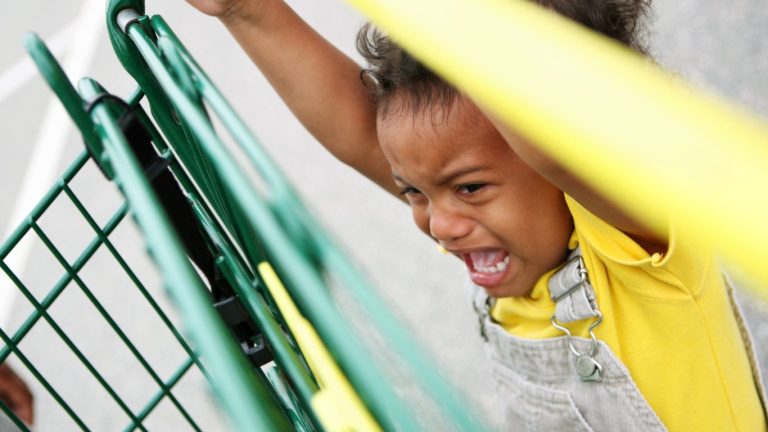When Reddit user u/RodneySquirrel said “I just saw the best handled temper tantrum in Wendy’s yesterday”, it sparked over 500 responses sharing their insights on handling tantrums. Here are some of the most effective strategies shared by parents, combined with professional advice on managing different types of tantrums.
Insights from Real Parents
1. The Snack and Shop
“My mom had this hack to avoid tantrums in the store. We would go in, choose one fruit or veggie as a snack, go back outside and eat it, then go in and shop. Reduced tantrums by a lot because some things don’t look as good when you have a full stomach.” – pumpkinthighs
2. The Swift Park Exit
“None of that “get over here or I’m leaving without you” stuff. My mom would scoop the kid up and get them buckled up before the kid had time to process what was happening.” – pumpkinthighs
3. Expectation Setting 101
“I tell her: “Sally (not her real name) this is what we are doing today. This is how I expect you to behave. If you are good, you will get a treat at the end. If you cannot behave, you will be returned home.” – Danivelle
4. Silent Consequences
“She calmy told him that if he did that again [kicking and screaming] that they would be leaving. And he threw sand and screamed. And she just picked up the baby and put her in their little wagon and started packing her things up. He saw and went into full blown tantrum mode. But she didn’t say anything and finished packing. Grabbed his hand, and they went back to their car and left.” – YeetMeIntoTheVoid91
5. Audience Removal
“I teach this in my child development lessons. If a child is having a tantrum you remove the audience. That means you leave the situation with kid if you’re in public or if you’re at home the parent leaves them in a safe place to continue the tantrum with no one watching. Works like gold”- DocSewer
6. The No-TV Whisperer
I was in a market when a woman’s two kids starting horsing around. She just quietly said, “ok, no TV time.” The kids cried “no” and settled down pronto. Obviously she had set rules and consequences and kept to them enough so just the threat of punishment was enough to get them in line. – missannthrope1
7. Playback Therapy
When I was young and having bad tantrums at bed time, my pediatrician told my parents to tape record me (mid 90s, no easy way to video lol) and play it for me the next day. I remember it, and I was horrified lol. Pretty sure I stopped after that” – blce1103
8. The Parent Stare Down
I have found most of my success with kids is through stern but confident words and steady eye contact. No need to yell at them as long as you get the parent stare down. – Crazyhates
9. Brain Overload Explained
“Temper tantrums in toddlers happen because of something like their little brains are in rapid development mode and they aren’t able to compute big emotions yet. Negative emotions are still new and confusing as children can become frustrated with not knowing how to handle it. Simply remove themselves from a public space to a more private one” – d2r7
Insights from Experts
I learnt from my friend and parenting expert, Amy McCready, that we can be more effective in helping our children deal with their feelings if we can recognise what type of tantrum your toddler is having.
There are tantrums of despair, where the child is distressed because he is frustrated or hurt or offended. And there are tantrums of control, where the child is furious or angry because he cannot have his own way. Let’s dig dipper into this.
Types of Tantrums
Tantrums of Despair
Sometimes, our children can be really upset or distraught.
Their friend hurt their feelings; they whacked their elbow on the table; they were promised a visit to the playground, and now it’s raining hard; part of a toy is broken, and Mum just turned down a request for a second helping of chips. Our child may be angry, tearful, or both.
In these moments, our child needs us to understand how upset they are and to help them express their feelings. Ideally, our tone of voice should match the intensity of their emotions.
“You really, really wanted more chips, but lunch is very soon.”
“Your feelings must be hurt by what your friend said.”
“You’re so disappointed that toy won’t work properly.”
Tantrums of despair require our emotional support. Simply keep your arms around your child, make comforting sounds, and wait until they have regained their equilibrium and can try again or leave it alone.
Tantrums of Control
Strong-willed children are more likely to scream rather than cry and will use an anger tantrum to try and force us to change our mind.
If running away or yelling isn’t working for them, they may resort to pushing or hitting, shouting unacceptable words, or even spitting to try and get their own way.
There is little point in trying to reason or argue with them. When our children are so enraged, they won’t listen to anything we have to say. Attempting to make logical and reasoned explanations is a waste of energy when our child is “all feelings and no thinking.”
Trying to distract an angry, determined child is nearly impossible, and threats of punishment rarely stop the rage. A child who isn’t in a calm, thinking state won’t be able to understand the potential consequences of their behaviour.
Tantrums of control require us to distance ourselves emotionally from our child until they realise they are not going to get their own way this time.
How to Actually handle Tantrums?
Support or distance? Check your feelings. If you’re feeling ‘poor little thing,’ then your child probably needs your emotional support. However, if your initial response is anger and you’re thinking ‘oh, you little …,’ then it’s likely your child is having a tantrum of control.
Try Empathy First
Ask, “Do you need a cuddle?” If it’s a tantrum of despair, your child will come to you for comfort, or at the very least, the tantrum will wind down a notch. Be there for your child, and wait until they’re ready to come to you.
If it’s a Tantrum of Control
If they shout, “I don’t like you! Leave me alone!” then it’s most likely a tantrum of control, and you need to create some distance. Walk away or place your child in their room. They’ll kick and scream a bit, but the distance will allow you both to find a calmer state.
After some time by themselves, many children will move from being angry to being upset. They’re now ready for a comforting cuddle.
In either case, what we’re after ultimately is that our child solves their problem and comes up with their own pro-social solution.
- It may be to stop yelling and get on with the rest of their day.
- It may be to let their little brother or sister have the block.
- It may be to leave the puzzle alone and find a more co-operative toy to play with.
- It may be to do what Mum has asked.
With emotional support our child feels comforted and understood and can calm down and think of a way to go about solving the problem.
Or, from a position of emotional distance, our child can decide that their current behaviour is getting them nowhere and they’ll need to behave differently.
Either way, we’ve kept the problem with the child; we’ve not moved to rescue or persecute. Our child has solved the problem and is demonstrating age-appropriate competence.
But wait, there’s more…
An over-tired or over-stimulated child can lead to a third type of tantrum – one I refer to as ‘too much day’ tantrums. These tantrums often occur after our child has had a perfectly wonderful party or outing and had a very enjoyable time. Everyone has told us, the proud parents, how well behaved and lovely our child was.
Yet within a very short space of time, the little angel has turned into a nasty piece of work, complete with flailing arms and legs, not to mention a temper, as soon as we leave the situation.
So what went wrong? We have gone to considerable lengths to ensure they had a good time and this example of bad behaviour is what we receive?
Essentially, having a great time can also be very exhausting for our children (it took me a long time to understand this), so when their tiredness catches up with them, they tend to “lose the plot.”
Of course there’s no magic answer; usually we simply have to get through the circumstances as best we can. A calm and quiet bath and stories before bed, plus a good night’s sleep can do wonders for restoring our children to their usually delightful selves.
Their tendency is to behave as if nothing has happened. We, however, may still be recovering!
Some useful articles and resources
For a great overview on the purpose of parenting try The Big Picture: Guiding your child’s potential, or Growing Great Families. For more expert advice on raising toddlers, check out our Preschooler: behaviour section.







These are insightful and useful strategies that have hit the nail on the head for us. The ‘too tired to cope even though the day has been awesome tantrum’ has been a relatively new struggle for us.
To add to this, ‘always carry snacks’ is the best advice we were ever given in order to combat the ‘hunger hulk’ that is a toddler with low blood sugar…
Great article. Thank you.
Ooo totally agree with ‘always carry snacks’, Katrina! Can avert many troubled times 😉